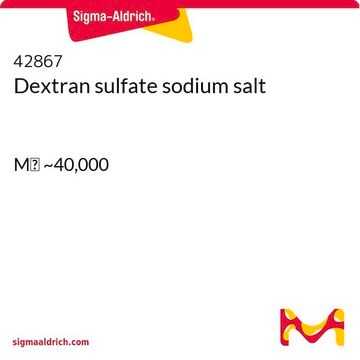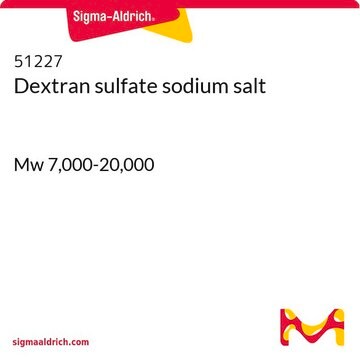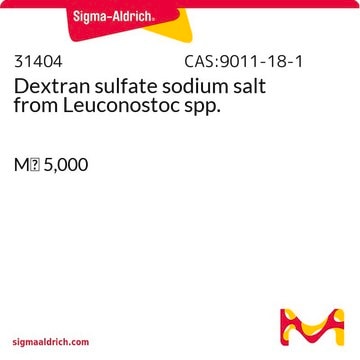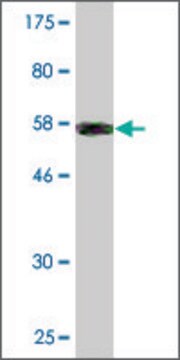모든 사진(1)
About This Item
Linear Formula:
CH3N=N(→O)CH3
CAS Number:
Molecular Weight:
74.08
MDL number:
UNSPSC 코드:
12352124
PubChem Substance ID:
NACRES:
NA.25
가격 및 재고 정보를 현재 이용할 수 없음
추천 제품
일반 설명
Azoxymethane (AOM) is a potent laboratory chemical used to study cancer initiation, progression, and prevention, particularly in the colon. It acts as both a carcinogen, triggering tumor formation, and a gene mutation agent, causing specific alterations in DNA.
애플리케이션
Azoxymethane (AOM), a gene mutation agent, may be used with dextran sulfate sodium (DSS) to create cancer models in laboratory animals which can be used to study mechanisms of cancer progression and chemoprevention.
생화학적/생리학적 작용
Carcinogen that induces O6-methylguanine adducts in DNA leading to G→A transitions. Induces tumorigenesis in the colon of laboratory animals and is used to study the mechanism of cancer progression and chemoprevention.
특징 및 장점
Versatile and adaptable for a wide variety of laboratory and research applications.
기타 정보
For additional information on our range of Biochemicals, please complete this form.
It is critical to determine the correct dosage of Azoxymethane for the experimental design to avoid premature death of laboratory animals.
관련 제품
제품 번호
설명
가격
신호어
Danger
유해 및 위험 성명서
Hazard Classifications
Acute Tox. 2 Oral - Carc. 1B - Eye Irrit. 2 - Flam. Liq. 3 - Skin Irrit. 2
Storage Class Code
3 - Flammable liquids
WGK
WGK 3
Flash Point (°F)
75.2 °F
Flash Point (°C)
24 °C
가장 최신 버전 중 하나를 선택하세요:
시험 성적서(COA)
Lot/Batch Number
이미 열람한 고객
Carlotta Tacconi et al.
Cancer research, 79(16), 4196-4210 (2019-06-27)
Colorectal cancer is a major cause of cancer-related death in Western countries and is associated with increased numbers of lymphatic vessels (LV) and tumor-associated macrophages (TAM). The VEGFC/VEGFR3 pathway is regarded as the principal inducer of lymphangiogenesis and it contributes
Eva Pastille et al.
PLoS pathogens, 13(9), e1006649-e1006649 (2017-09-25)
Inflammatory bowel diseases (IBD) are chronic inflammatory disorders of the gastrointestinal tract, strongly associated with an increased risk of colorectal cancer development. Parasitic infections caused by helminths have been shown to modulate the host's immune response by releasing immunomodulatory molecules
Sonia Leon-Cabrera et al.
Cancers, 10(9) (2018-09-22)
Signal transducer and activator of transcription 1 (STAT1) is part of the Janus kinase (JAK/STAT) signaling pathway that controls critical events in intestinal immune function related to innate and adaptive immunity. Recent studies have implicated STAT1 in tumor⁻stroma interactions, and
Qifan Zhu et al.
Journal of immunology (Baltimore, Md. : 1950), 193(10), 4779-4782 (2014-10-17)
Stimulator of IFN genes (STING) is a cytoplasmic innate immune sensor for cyclic dinucleotides that also serves a dual role as an adaptor molecule for a number of intracellular DNA receptors. Although STING has important functions in the host defense
Shiyan Wang et al.
Cancer research, 79(16), 4086-4098 (2019-06-27)
Tripartite motif (TRIM) family proteins participate in a variety of important cellular processes, including apoptosis, cell-cycle arrest, DNA repair, and senescence. In this study, we demonstrated that a novel TRIM family member, TRIM67, was commonly silenced in colorectal cancer and
자사의 과학자팀은 생명 과학, 재료 과학, 화학 합성, 크로마토그래피, 분석 및 기타 많은 영역을 포함한 모든 과학 분야에 경험이 있습니다..
고객지원팀으로 연락바랍니다.